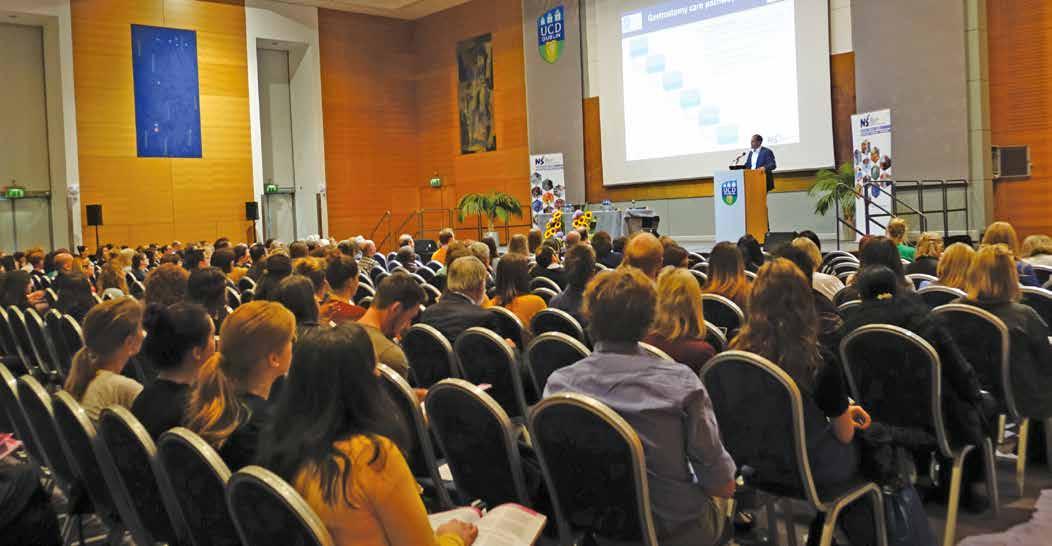
3 minute read
Future of The Nutrition Society Summer Conference
Professor Andy Salter (Honorary Scientific Officer)
Professor Alison Gallagher (Honorary Programmes Officer)
To many the Summer Scientific Conference is seen to be the highlight of the Society’s calendar. It is the largest of our scientific conferences and attracts delegates and speakers from around the world. The symposia offer the opportunity to hear from internationally recognised Nutritional Scientists, while the Original Communication sessions provide a valuable opportunity for researchers, in particular research students and early career scientists, to present their work to the Nutrition Community. It also represents the opportunity for Nutritionists from food industry, clinical and academic backgrounds to socialise and debate the current ‘hot topics’. The papers which are produced and published within Proceedings of the Nutrition Society represent some of the most cited work in the nutrition arena.
As you will be aware, organising such a conference presents an immense amount of work for the Honorary Officers, Theme Leaders, Nutrition Society staff and Local Organisers. We would normally start planning such a scientific conference at least two years in advance and, having settled on a venue, we work with the local organisers to develop a programme and identify potential speakers and sponsors. As the date approaches, calls for abstracts need to be issued, submissions reviewed and oral and poster sessions timetabled. On top of all of this the Society staff work with the chosen venue to ensure all housekeeping issues are under control. Those of us who have acted as local organisers will remember well the anxiety felt as the date approaches and the relief when all (more or less) went to plan.
The diverse nature of Nutrition means that inevitably some symposia are received more positively by some sections of the Society than others. However, we also often hear how members value the opportunity to catch up on topics they would normally regard as ‘outside their comfort zone’. In general, we do try to ensure that under the umbrella of a general topic, specific sessions address the major ‘themes’ of the Society: Cellular and Molecular Nutrition, Public Health Nutrition and Whole Body Metabolism. Overall our scientific conferences are reviewed very positively by attendees. However, we are anxious to hear the views of those who do not regularly attend these scientific conferences. Over the coming months we will be launching a survey of the membership’s views of the future format of our scientific conferences. We are keenly aware of all of the pressures on both your time and money and want to ensure that we are doing as much as possible to provide a product which satisfies as many members as possible.
Questions will include:
TIMING of conferences
The Society organises four main scientific conference per year: the Spring Conference (held in Scotland, usually in March), the Irish Section Conference (in June), the Summer Conference (in July, moving around the UK and Ireland) and the Winter Conference (held in London, in December). Is the timing and location of these conferences the most appropriate? Does attendance at one normally preclude (on the basis of time or cost) attendance at others?
COST of conferences
The Society has always tried to keep the cost of conferences as low as possible and registration costs are set to try and ensure conferences ‘break even’. To do this we actively need to attract appropriate sponsorship from industry (in line with a strict policy). Is the cost of registration and/or social events a barrier to people attending conferences? Should we make registration free to certain classes of membership such as students, early career or retired members?
TOPICS and venues
In recent years we have asked for bids from potential local organisers and include a general topic (decided by our Science Committee) within the call. Bids have been considered by Science Committee primarily on the basis of the preliminary programme but also taking account of the need to move the conference around the country. Is this the best strategy? Should we settle on one (or two) venues for all future conferences based on the facilities available?
lENGTH and Structure of conferences
Summer conferences have traditionally lasted 3-4 days. In recent years we have trialled incorporating some parallel scientific sessions to increase the number of topics covered. However, we always avoid timetabling plenary and Original Communication (OC) sessions at the same time. Is this the best strategy? Researchers are invited to submit OCs for Oral or Poster presentation, and all accepted abstracts are published in Proceeding of the Nutrition Society. We are one of the few Societies that timetable specific poster presentations when the author gives a brief overview and answers questions; in delegate feedback from our conferences this has often been very positively evaluated. Do you feel this is still valuable? Should we try and move toward more use of electronic poster boards?

We firmly believe that it is vital to the Society that the Summer Conference is seen as a flagship event for Nutritionists around the world and that we continue to attract world class speakers, those just starting out in their career and an audience which is representative of the ‘broad church’ that is nutritional science. We very much hope that you will start to give these questions some thought and you will take a few minutes to engage with our survey when it is launched




